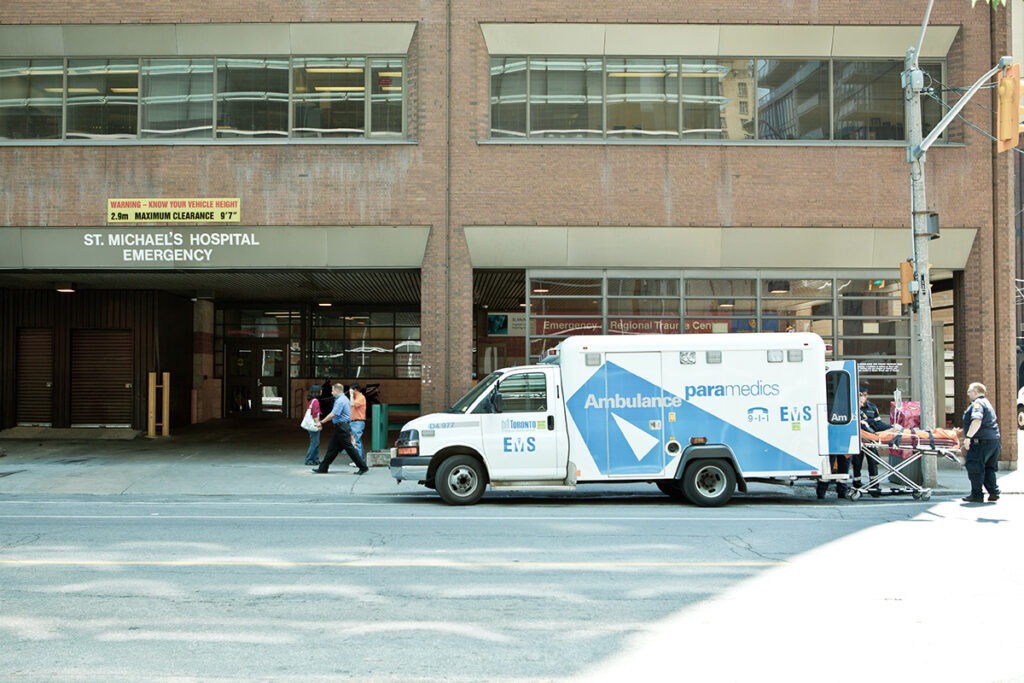From Unity Health Toronto
A study of emergency department (ED) visits for drug overdoses in Ontario during the COVID-19 pandemic reveals that overdoses were disproportionately higher among people experiencing homelessness.
The findings, published in Addiction, show that in Ontario from June to September 2020, when the province was reopening after wave 1 lockdown measures, weekly rates of ED visits for drug overdoses more than doubled among homeless individuals compared to the same time the year prior. Increases of this magnitude were not observed among the stably housed or those living in low-income neighborhoods.
The study shows that the impacts of the pandemic have disproportionately harmed individuals experiencing homelessness, and suggests that greater supports are needed to address the intersection of homelessness and drug use.
“These findings confirm one shameful truism of this pandemic – that vulnerable populations have been time and time again disproportionately impacted by the COVID-19 pandemic,” said Michael Liu, lead author of the study, a research coordinator at St. Michael’s MAP Centre for Urban Health Solutions, and visiting scholar at ICES.
“This is a population that already contends with immeasurable difficulties, and we have failed to protect them during the pandemic. There are clear policies and interventions that need to be put in place to support and protect the most vulnerable within our cities and neighborhoods,” said Mr. Liu, who is also a medical student at Harvard University and a Rhodes Scholar.
Researchers at St. Michael’s Hospital of Unity Health Toronto used data from ICES, the not-for-profit research institute, to categorize over 15.2 million Ontarians into three groups based on their housing status: individuals with a recent history of homelessness, all housed individuals, and individuals living in low-income neighborhoods.
To understand how the pandemic impacted overdoses for the people within these groups, researchers retrospectively analyzed ED data during three stages: pre-pandemic (January 5 to March 16, 2020), peak (March 17 to June 16, 2020), and re-opening periods (June 17 to September 26, 2020). The researchers used corresponding weeks in 2019 as a benchmark to measure against. They found:
- There was an overall increase in ED visits for overdoses among all three housing groups from 2019 to 2020.
- The increase was most pronounced in individuals with a recent history of homelessness. There was a 56 percent increase in ED visits for overdoses during the re-opening period of 2020 compared to the same weeks in 2019.
- Looking just at 2020, rates of ED visits per 100,000 people for drug overdoses among recently homeless individuals were 148 times higher than that of all housed individuals and 22 times higher than that of low-income housed individuals.
- ED visits for drug overdoses decreased across all groups by approximately 20 percent during the peak period compared with corresponding weeks in 2019.
“Our study shows the enormous toll that drug overdoses have taken on people experiencing homelessness during the pandemic,” said Dr. Stephen Hwang, senior author of the study and Director of MAP Centre for Urban Health Solutions at St. Michael’s Hospital.
“We need to act right now to prevent overdoses, which all too often end up causing tragic and preventable deaths,” said Dr. Hwang, who is also an internal medicine physician and Chair in Homelessness, Housing and Health at St. Michael’s Hospital.
The authors are calling for urgent public health and policy interventions to reduce the burden of drug overdoses and substance-related problems in this population, including greater access to supervised consumption facilities, fentanyl testing strips, naloxone, low-barrier opioid agonist therapies, and tailored office-based addiction treatments. The authors say the services need to be brought directly to people experiencing homelessness through mobile street teams, community-based agencies, and shelter services.
“Difficulties with substance use and homelessness are inextricably linked. Stable housing is necessary – although not sufficient – to address the unacceptably high rates of morbidity and mortality in the homeless population,” said Mr. Liu.
Les visites aux urgences dues à des surdoses de drogue sont disproportionnellement plus nombreuses dans la population des personnes sans-abri en période de pandémie : étude
Une étude portant sur les visites dans les salles d’urgence causées par des surdoses de drogues en Ontario pendant la pandémie de COVID-19 révèle que les surdoses étaient proportionnellement beaucoup plus nombreuses chez les populations de personnes sans-abri.
Les conclusions, publiées dans la revue Addiction, révèlent qu’en Ontario, de juin à septembre 2020, au moment où la province se déconfinait après la première vague de mesures de confinement, les taux hebdomadaires de visites aux urgences en raison de surdoses de drogues ont plus que doublé chez les sans-abris par rapport à la même période l’année précédente. Des augmentations de cette ampleur n’ont pas été observées chez les personnes ayant un logement stable ou vivant dans des quartiers à faibles revenus.
L’étude révèle que les répercussions de la pandémie ont nui de manière disproportionnée aux personnes sans domicile fixe et elle indique que des mesures de soutien plus importantes sont nécessaires pour faire face aux conséquences de la réciprocité entre les personnes sans domicile fixe et la consommation de drogues.
« Ces résultats confirment un triste cliché de cette pandémie, à savoir que les populations vulnérables ont été à maintes reprises touchées de manière disproportionnée par la pandémie de COVID-19 », a déclaré Michael Liu, auteur principal de l’étude, coordonnateur de recherche au Centre MAP pour des solutions de santé urbaine de l’hôpital St. Michael et chercheur invité à l’ICES.
« Il s’agit d’une population qui doit déjà faire face à des difficultés incommensurables, et nous n’avons pas su la protéger pendant la pandémie. Il existe des politiques et des interventions concrètes qui doivent être mises en place pour soutenir et protéger les plus vulnérables dans nos villes et nos quartiers » a déclaré M. Liu, également étudiant en médecine à l’Université de Harvard et boursier Rhodes.

